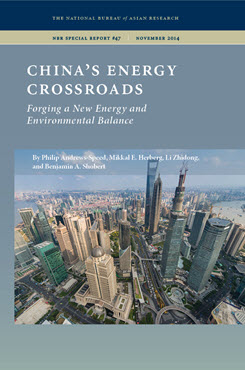China's Search for Oil and Gas Security
Prospects and Implications
This essay explores China’s impact on global markets for oil and gas and highlights implications for policy and industry.
EXECUTIVE SUMMARY
This essay explores China’s impact on global markets for oil and gas and highlights implications for policy and industry.
MAIN ARGUMENT
China’s transformation into an energy superpower means that its strategies and goals now have far-reaching implications. The rapid growth in Chinese energy demand has long had major impacts on world oil markets and prices. But more recently, the country’s enormous drive to expand natural gas use has begun to have added important regional and even global impacts on gas and LNG markets. The continuing quest for energy security is thus accelerating China’s emergence as a regional and global power. Decisions by Beijing influence not only the country’s domestic trajectory but regional and global outlooks for energy supply availability, environmental security, and geopolitics. These trends are adding complexity to what is already a highly interconnected global picture for energy and environmental security. They are increasing the importance of China’s strategic and economic relationships with its neighbors and major producer countries as it seeks to promote supply security and as other powers seek to adapt to China’s global rise as a crucial strategic and economic player.
POLICY IMPLICATIONS
- Almost all of China’s incremental oil consumption will need to be imported, and such growth will inevitably drive China to enlarge its presence abroad. Ultimately, this will further accelerate the country’s emergence as a regional and global power, yet also intensify its diplomatic dilemmas and challenges.
- China’s growing dependence on maritime oil supplies will be an additional “multiplier” in animating Chinese leaders’ interests in territorial claims in the South and East China Seas. It will also increase attention to questions related to the control of Asia’s vital energy sea lanes. These issues are already highly contentious, and the heightened focus on them will bring with it new questions for policymakers across the Asia-Pacific.
- China is on target to raise its domestic gas consumption enormously, but this will mean depending on imports for roughly one-half of its gas needs. This trend is driving China to rapidly expand its energy reach across Central Asia and increasingly to Russia through large pipeline deals that will link China to these suppliers for the long term. Hence, gas is also driving China’s growing regional power and influence.
Mikkal E. Herberg is a Senior Lecturer in the Graduate School of International Relations and Pacific Studies at the University of California–San Diego and Research Director of the Energy Security Program at the National Bureau of Asian Research.


